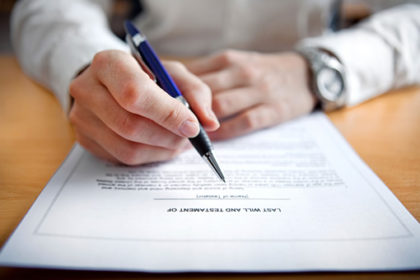
Making a will : Two-thirds of adults in Ireland have not made a will which suggests that many of you may not be aware that having a will saves legal and personal complications for your loved ones when you pass away.
I’ll begin with the basics – what a will is. A will is a legal document detailing how someone’s possessions should be divided after their death.
Testator
The person making a will is called a testator. A testator may change a will at any time.
I would recommend that a person regularly review their will – we all live in changing times.
Witnesses
A will must be signed and witnessed by two people present at the same time. Witnesses should not benefit from the will.
Safeguard your Will
There is no requirement to register the will once it is signed, but it should be kept safely because it must be proven officially after death.
In most cases people will leave the original will with their solicitor for safekeeping as this will reduce complications at a later date.
You can, if you wish, take the will away once it is signed but it should be kept in a very safe place – a safe at home or in a safety deposit box.
It is advisable to tell someone where the original will is kept.
Executors
You choose who is to carry out your wishes in your will by appointing executors. Unlike witnesses executors can be beneficiaries in the will.
The executor does all the paperwork necessary to transfer the property to the people named in the will and liaises with the solicitor to complete all the legal formalities.
The law says that you only need to name one executor but in most cases people would appoint two executors.
A Letter of Wishes can be written for the Executor – it does not have legal effect, as such, but gives direction to the Executor e.g. where your child might go to school, who receives items of jewellery such as a wedding ring.
When Changes Take Effect
A will only takes effect after the death of the author.
This means that making a will does not prevent a person from dealing with property or money after the will is made.
A person is entitled to do what they want with the money during their lifetime. The same applies for any other property whether it is a car, a house or shares.
Why Make a Will
The author of the will decides what is to happen to THEIR property after their death.
If you do not make a will, the law dictates that your property is distributed amongst your closest relatives.
Many people like to make gifts of money or of particular items such as furniture, clothing, or personal belongings to friends or relatives. These can be included in your will, no matter how big or small.
Who Should Make a Will
Everyone should make a will. It is a common misconception that making a will is for wealthy people – this is not true. A will is a personal matter. It is a matter for every individual to decide for themselves who to leave their property to. It is up to the individuals themselves to decide whether or not they want to discuss the contents of the will with family members. It is, however, advisable to inform the executor the whereabouts of the will.
Everyone’s affairs are better ordered if a will is made – it gives people peace of mind. It makes it easier for friends and family if their loved one leaves a will and it is usually cheaper in the long run.
When to Make a Will
It is appropriate to make a will on reaching certain stages in life, such as: becoming the owner of property, getting married, divorced or separated, buying a house, having children, inheriting property (or winning the Lottery!), and retiring, getting older or suffering illness.
There is no time like the present and particularly as Best Will in the World Week starts on Monday you can have a will consultation with us for €50.

